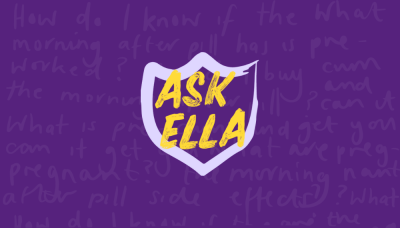Having sex during your period may not appeal to everyone but with hormones raging around the body and the bonus of added lubrication, there’s nothing stopping couples from having a bloody good time.
The big question – one we’re asked all the time – is, can you get pregnant on your period? Surely if you’re bleeding you couldn’t possibly be ovulating as well, right?!
Sadly it’s a little more complex than that and there’s still a chance that you could fall pregnant if you have unprotected sex while on your period.
We spoke to Emma from Sexplain* to get the nitty-gritty details about period sex and pregnancy.
What is ovulation?
The chances of getting pregnant from having sex during your period depend on a few main factors, the first of which is of ovulation.
“An egg is released from the ovaries typically every month or so, under the control of various hormones, about two weeks after the start of a period,” says Emma. Unfortunately, the menstrual cycle is rarely that simple.
This means it can be difficult to know exactly when you are ovulating and when the risk of pregnancy is highest.
It’s also important to take into account the length of your menstrual cycle. “A short menstrual cycle means that ovulation may occur very soon after the period,” Emma says. You could be in your fertile window sooner than you might think.
“If ovulation occurs shortly after your period, it makes it more likely that you could get pregnant if you have sex during menstruation,” says Emma, “It is theoretically possible to ovulate more than once in a calendar month.”
This would mean you have a very short cycle and consequently that your day of ovulation may be sooner than you think. This could potentially make it more likely for you to get pregnant on your period.
How long can sperm survive in your body?
Once an egg is released from your ovaries it is viable (able to be fertilised) for around 12 to 24 hours. As Emma explains, “if the egg comes into contact with sperm during this time, it can result in a pregnancy.” If not, it dissolves.
But what about the lifespan of sperm? “Sperm have a lifespan of up to five days,” Emma tells us. “They can stay alive in the reproductive tract and be capable of fertilising an egg for several days.”
So if you have unprotected sex on your period and ovulate shortly after then any remaining sperm will be able to fertilise the egg that is released.
Even if you aren’t ovulating at the time you have sex, “conception can occur several days after sex has taken place.”
What is irregular bleeding?
There is a chance that you could get pregnant from sex during your period, but that’s not all. “Another factor to consider is unusual or irregular bleeding from the reproductive tract that may look like your period, but may be something else,” Emma explains.
Bleeding like this can be due to infections or changes to the tissue in the vagina or uterus. If you experience abnormal bleeding (e.g. in colour, smell or experience pain) it’s best to go and speak to your doctor.
You may mistake this bleeding for your period and assume that it means there is less chance of getting pregnant. “But if the bleeding is not a true period there may be an increased chance of you getting pregnant as you could be anywhere in your cycle, including a fertile point.”
Let’s wrap this up
So what have we learned today? That if you don’t want to get pregnant then you should always use some form of regular contraception, even during that time of the month.
According to Emma, barrier methods such as condoms are a good option for period sex. “There is generally a greater risk of passing on infections during sex when someone is on their period”, she says, “simply because most infections are easier to transmit in larger amounts of fluid than they are just from contact. After all, period blood is just another bodily fluid!”
So if you’re on your period and you want to get down and dirty, make sure your man suits up before he walks the red carpet.
If you have any more questions about contraception, sexual or reproductive health use #AskElla to send us your questions and we’ll do our best to answer them. Don’t forget to check out our other #AskElla content here!
Have you ever taken the morning after pill and wished you knew more about it? Visit #MyMorningAfter stories to share you experience with us and join a community of women breaking this taboo.
*Emma does not endorse any medicinal brands or products.
ellaOne® 30mg film-coated tablet contains ulipristal acetate and is indicated for emergency contraception within 120 hours (5 days) of unprotected sex or contraceptive failure. Always read the label.








